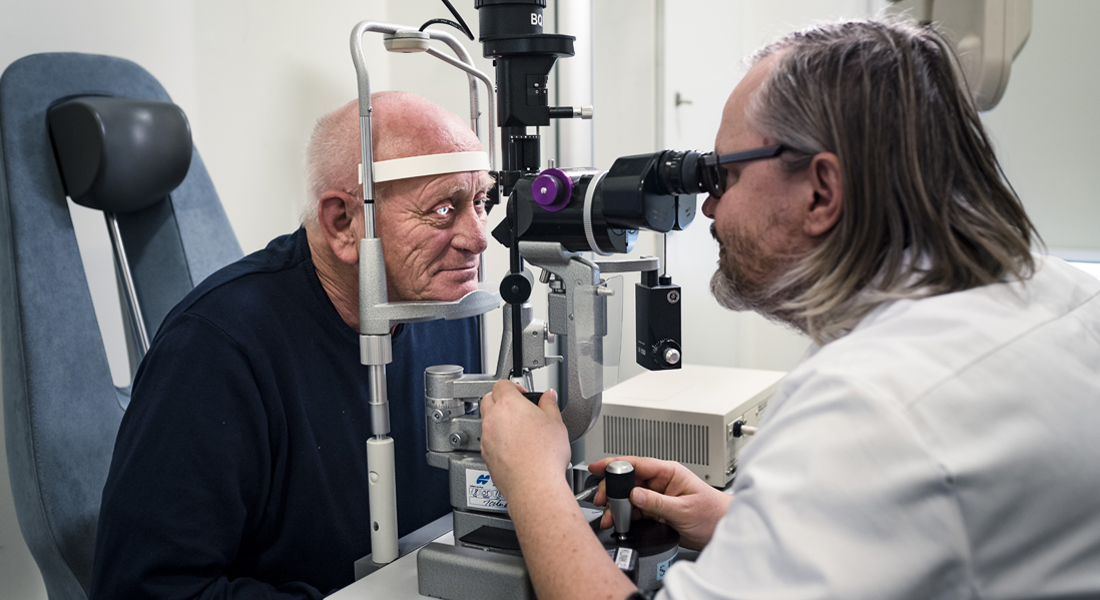Person-centred care in aging populations
|
The goal of our interdisciplinary research is to enhance person-centred, diversity-sensitive and high quality healthcare delivery for the increasing number of older adults. With aging as a key societal challenge, our work feeds into re-thinking healthcare policy and practice. |

We explore how to provide healthcare that reflects the preferences, needs and values of the individual person in his/her life context. In order to identify innovative approaches to ensuring healthcare services that are person-centred and of high quality for the increasing number of older adults, we work within an overall frame of interdisciplinary, multi-methods and co-created science.
Key partners span across patient groups, municipalities, hospitals, patient associations, companies and international organizations.
Our projects focus on access to and quality of healthcare seen from the perspectives of citizens/patients, relatives and healthcare professionals. Multimorbidity features strongly in addition to specific diseases and conditions, in particular cardiovascular diseases, cancers, multiple sclerosis, diabetes, mental health and visual decline. Some studies addresses prevention potentials related to e.g. work-place interventions.
We aim to enhance relevance, transferability and ultimately societal impact of research. Science communication using multiple channels including radio, blogs, public events, graphic methods, and social media is an important part of our work.
“There is a need for insight into how healthcare services can accommodate for the growing number of persons living longer lives in longevity but also with functional decline and diseases. Person-centred and coordinated care that is sensitive to diversity in older adults – e.g. related to type of disease, gender, socioeconomic background or ethnicity – is important, also from a societal perspective. We aim to understand needs of citizens, patients, relatives and healthcare providers, and to help identify innovative approaches for future care delivery,” says Professor and Group Leader Maria Kristiansen.
|
Multiple Sclerosis (MS) has traditionally been perceived as a “young disease” and support offered to people with MS focus on themes relevant for a young target group such as family planning and working life. Because of medical advances and the general aging of the population, the demographics of people living with MS is, however, changing with a quickly growing number of older adults. Nonetheless, little remains known about older adults with MS and the kind of support they need. In this project we wish to contribute to this scarce area of research by investigating which challenges and resources that shape how older adults with MS manage their disease in their everyday life. Further, the project will deploy a co-creation methodology and investigate how it can contribute to designing and developing relevant support offerings to the group in the future.
The project is designed with inspiration from participatory research. A co-creation methodology is deployed to investigate how engagement of the project’s stakeholders can contribute to designing and developing relevant support offerings to older adults with MS in the future. A key co-creation element is the establishment of an advisory group consisting of eight older adults living with MS that contribute to the execution of the project. Further a selected group of employees from the Danish Multiple Sclerosis Society has been invited to be part of the project and work with the translation of the results to initiatives on an on-going basis. |
In this systematic review and longitudinal study in collaboration with Rigshospitalet, we review the effects of patient-engagement interventions for older adults with multimorbidity overall, with an in-depth case study of needs for and approaches to enhance person-centred pre-dialysis care trajectories. Based on a multi-method and participatory design, we explore patient trajectories for patients in a nephrology ward, and the experiences of nurses and medical doctors in providing person-centred care and supporting decision-making. The study includes exploration of the development and implementation of a co-created organizational approach to more timely, systematic and structured patient engagement.
Person-centred care in a nephrology ward
Reflecting the need to systemise person-centred care, a specialised nephrology department in the Capital Region of Denmark, initiated a restructuring of clinical practice in 2019 including establishment of a pre-dialysis outpatient clinic to ensure timely preparation for renal replacement therapy. A longitudinal qualitative multi-perspective research project containing several sub-studies was initiated to feed into the structural changes by exploring nephrology care trajectories from a patient, healthcare professional, and organisational perspective. Further reflecting findings across participants, a graphic conversation tool was developed. The tool is divided into two aspects with one illustrating the biomedical circumstances with different available treatment trajectories whereas the other aspect reflects the need to enhance a person-centred approach to clinical encounters with in-depth conversations on individual life circumstances. The tool aims to act as a holistic conversation aid, to guide conversations in clinical encounters, and to support patients in selecting the treatment as they see fit.
Link to the conversation tool, part one: "Your Treatment Options"
|
Through the last decades, mortality from heart disease has decreased due to improved primary and secondary prevention and advances in the medical and surgical treatment. With the improved survival more people need cardiac rehabilitation, and it is therefore essential to ensure effective rehabilitation programmes of high quality. Cardiac rehabilitation has primarily been evaluated on clinical outcomes and less on the ability to promote level of function, including return to work (RTW). RTW is however an important rehabilitation goal, as work plays an important role for psychological and social wellbeing, and loss of productivity has economic costs for society. The aim of cardiac rehabilitation is to allow patients, as far as possible, to return to their activities of daily living, but even though the Danish national clinical guideline for cardiac rehabilitation cover vocational counselling, RTW following heart disease seems to remain suboptimal. Therefore, the aim of this PhD-project is to generate new knowledge needed for targeting vocational rehabilitation and enhancing RTW following heart disease. The project focuses on the RTW process and investigates patient-reported reasons to RTW, predictors of RTW, and patient experienced barriers and facilitators associated with RTW. The PhD-project is conducted as a mixed method study, including survey- and register-based studies, and a qualitative in-depth interview study. Focusing on patients’ perspectives on RTW the research project adds to a relatively limited research field and generates knowledge essential for improving cardiac rehabilitation and activities and initiatives in Danish Heart Foundation. |
|
According to the World Health Organization, promotion of smokeless environments in workplaces and public places is one of the most effective existing tobacco control methods. Since most adults spend about a third of their day in a workplace, it appears to be a well-established and useful setting for implementation of smoke-free environments. In this PhD project situated within the Danish Heart Foundation, we follow a private Danish production company that implemented smoke free work hours to promote health and well-being among employees. The overall purpose is to investigate whether the implementation of smoke free work hours will change the number of smoked cigarettes per day pr. employee one year after implementation. Furthermore, the study aims to assess dynamics related to compliance, enforcement and mental health. The project uses a convergent multi-methods design with data collection using three approaches: an electronic survey at baseline and follow-up, focus group interviews, and fieldwork. To evaluate the implementation process, the study will apply the context, process and outcome (CPO) evaluations model that views the entire intervention process as a continuous change and distinguishes between proximate, intermediate, and distal outcomes of interventions. |
|
Diabetes is increasing worldwide, leading to increased morbidity and mortality, and the disease constitutes a large burden for societies, healthcare systems and individuals. A growing diabetes prevalence combined with increasing life expectancy means that people live longer with diabetes, potentially developing diabetes-related complications at an early age. Although around 25.000 in the age group 18-45 years live with diabetes in Denmark, little is known about their burden of complications. The aim of this PhD is to expand the current knowledge about younger adults (aged 18-45 years) living with diabetes-related complications in Denmark, including prevalence of complications, associated sociodemographic characteristics, resources and needs for support and to develop a tailored intervention to improve their quality of life and well-being. Data is collected using mixed methods, combined with participatory approaches. The project consists of 3 phases. Phase 1 is a registry-based study investigating the prevalence of diabetes complications among younger adults (18-45 years). Phase 2 contains a qualitative study with semi-structured interviews and focus groups exploring resources and needs in the target group and identifying relevant intervention themes. Findings from previous phases will inform phase 3, co-creation and pilot testing of a tailored intervention to promote quality of life and prevent further deterioration among younger adults with diabetes complications. The study will contribute to a better understanding of younger adults living with diabetes complications and support improvement of quality of life among a supposedly vulnerable part of the diabetes population. |
Materials from open research seminar, January 22 2019
Below is a list of materials from our open seminar focusing on enhancing person-centered healthcare that is respectful of and responsive to citizens’ preferences, needs, and values. Approximately 200 persons signed up for the seminar, representing a wide variety of stakeholders. We are very thankful for this overwhelming support and for all contributions made before, during and after the seminar.
Presentations from all presenters, inputs from the software used during the seminar and from moderated discussions during and after the seminar are available below. You can find the program here together with a brief article describing the seminar.
We aim for more seminars to foster continued dialogue and partnerships in research and outreach within this field. Based on feedback, the next seminar will focus on exchanging experiences and perspectives on tools and approaches to ensuring person-centered, engaging healthcare.
A LinkedIn group will be established to support continued dialogue and partnerships.
Presentations
- Welcome and Introductions by professor and managing director Lene Juel Rasmussen
- From Industrial Health Care Towards Careful and Kind Care by Victor Montori
- What is Kind, Enabling and Personalised Care, and Who is This Important For? by Maria Kristiansen
Output
- Poster drawn by hand
- Pre-Seminar Poll Word Cloud
- Post-Seminar Discussion Word Cloud
- Participant Questions
Jensen AN, Bonnén KB, Kristiansen M. "We don't talk about his heart": Narrative sense-making and long-term readjustment among older out-of-hospital cardiac arrest survivors and their spouses. Resuscitation Plus, vol. 3, 2020. https://www.sciencedirect.com/science/article/pii/S2666520420300242
Sandholdt CT, Cunningham J, Westendorp RGJ, Kristiansen M. Towards inclusive healthcare delivery: potentials and challenges of human-centred design in health innovation processes to increase healthy aging. International Journal of Environmental Research and Public Health, 17(12):4551, 2020. https://pubmed.ncbi.nlm.nih.gov/32599806/
Nyholm N, Halvorsen I, Mygind A, Christensen U, Kristiansen M. Diversity in cancer care: exploring social categories in encounters between health-care professionals and breast cancer patients. Scandinavian Journal of Caring Sciences, 32(3):1108-1117, 2018. https://pubmed.ncbi.nlm.nih.gov/29341201/
Dencker A, Kristiansen M, BA Rix, Bøge P, Tjørnhøj-Thomsen T. Contextualization of patient-centred care: A comparative qualitative study of healthcare professionals´ perspectives on communicating with severely ill patients about their dependent children. European Journal of Cancer Care, 27(1), 2018. https://www.semanticscholar.org/paper/Contextualisation-of-patient%E2%80%90centred-care%3A-A-study-Dencker-Kristiansen/4a9e31f0b6b03ba6a93bc76354eedd6081f67ef5
Kristiansen M, Razum O, Tezcan-Güntekin H, Krasnik A. Aging and health among migrants in a European perspective. Public Health Reviews, 37:20, 2016.

Group Leader
Maria Kristiansen
Professor, Vice Director
E-mail: makk@sund.ku.dk
Phone: + 45 35 33 48 05
LinkedIn: Maria's profile
Group members
| Name | Title | Phone | |
|---|---|---|---|
| Sofie Olsgaard Bergien | PhD Student | +4535321450 |
External collaborators
| Navn | Titel | |
|---|---|---|
| Sidsel Marie Bernt Jørgensen | Ph.d studerende | sidselmrj@hjerteforeningen.dk |
| Lærke Lidegaard | Ph.d studerende | llg@hjerteforeningen.dk |
| Sofie Buch Mejsner | Ph.d studerende | sbmejsner@health.sdu.dk |
| Laura Glahder Lindberg | Ph.d studerende | laura.glahder.lindberg@regionh.dk |
